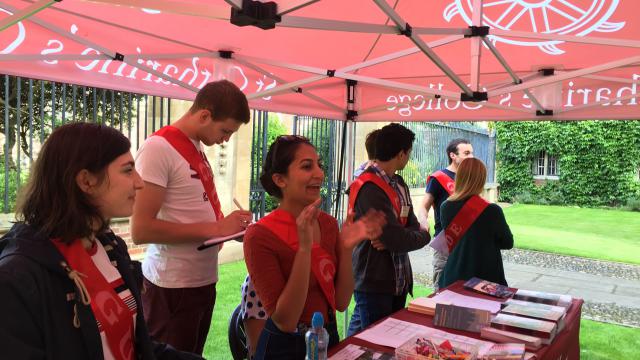We want all applicants with strong academic potential to consider studying at St Catharine’s, regardless of any disability, illness or learning difficulty they may have.
Many applicants need individualised consideration of the support they need to apply successfully to the College, and to thrive once they become a student here. These include:
- Applicants with a disability – those with a physical or mental impairment that has a substantial and long-term negative effect on their ability to do normal daily activities
- Applicants with a short-term injury or illness, particularly around the time of interview
- Applicants with specific learning difficulties (SpLDs) such as dyslexia or dyspraxia
- Applicants with autism may also require special consideration, whether or not they also have an SpLD
At the application and interview stage
When you apply to St Catharine’s we strongly recommend that you declare anything which might affect your ability to participate in an the admissions process. Of particular importance are:
- Your safety in the college – for example if you need to evacuate from a building during a fire
- Your ability to access your interviews – for example if they take place up three flights of stairs
- Any special conditions you may need when sitting your Admissions Assessments (e.g. extra time for a SpLD) or during the interview (e.g. the need to lip read)
However, we recommend that you also declare anything that might be important in future, as well.
We worry that many candidates do not declare disabilities because they fear it will affect their chances of gaining a place. We can assure you that this is not the case, and that the more information we have about your individual needs, the more help we can offer.
There will be opportunities during the online UCAS and Cambridge application process for you to state disabilities or SpLDs you may have. However, if you feel that your situation does not ‘fit’ one of the categories offered, or that the categories were too generic, then we encourage you to e-mail the Admissions Office (address at the foot of this page).
Also, you may find that you are eligible for the Extenuating Circumstances Scheme if your education has been interrupted or disadvantaged.
Every year we make special arrangements during the admissions process – allowing some candidates extra time in their Admissions Assessments, relocating interviews to the ground floor, notifying interviewers that they must speak especially clearly – but we can only do this if you explain your needs in advance.
Before and after new students arrive
The same principles apply once a student’s place is confirmed at St Catharine’s. If they have not yet declared a disability then we strongly encourage them to do this now. There are four main ways it can be done.
- You should contact the University’s Disability Resource Centre (DRC). They will probably create a ‘Student Support Document’ which details the support you need, and if you give permission (which we advise you do!) this will be sent to the College and your subject department.
- All students are sent a link to the College’s online Freshers’ Questionnaire. This includes a section where incoming students state preferences for accommodation types and rent bands. If your disability means you need a particular type of room (en suite, or ground floor, for example), then there is space for you to state this here.
- You should e-mail the College Admissions Office (address below). Even before the DRC produces their advice, we can start thinking about who here might be able to help – we have a dedicated Head of Wellbeing, College Community Practitioner, Tutor for Disabilities, a Health and Safety Officer, and the porters often advise on safety, as well. Once you are here, the staff of the Tutorial Office (ground floor, C staircase) will also assist with arranging any special conditions you will eventually need for exams.
- Once you are here, the college allocates all students a pastoral 'tutor'. Within a few days of arriving, you will get the opportunity to inform them of your situation, and they will be a key person in helping you make the most of the College and the University
- You should also consider whether you might be eligible for Disabled Students' Allowance, which can provide funding to support additional needs as well as, importantly, a route to valuable mentoring. You should be aware that a mental health condition which has adversely affected your everday life or study for a year or more may render you eligible for this benefit.
Of course, many students do not really know what help they will need until they start here, or whether they will need any help at all – so they often simply commence their academic and non-academic life here and ‘see how it goes’. This is absolutely fine, and indeed can make a great deal of sense, but we still encourage you to declare any disabilities or other factors as soon as possible, so timely support can be provided if it is ever needed.
For more information, you can also read St Catharine's Accessibility Guide.





